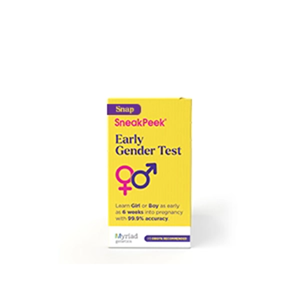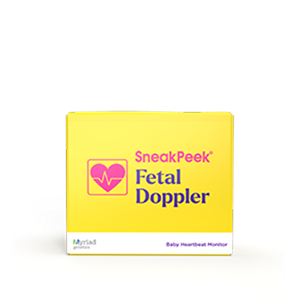Published on December 7th, 2023
Check out SneakPeek Gender Test to find out your baby’s gender as early as 6 weeks at over 99% accuracy1!
From sleep-supporting lavender to cleansing tea tree, essential oils are widely used in self-care practices like aromatherapy and skincare. Given their therapeutic associations, they’ve developed something of a “soft” reputation—but they can be quite potent, and if you’re pregnant, it’s important to know how to use them.
The #1 guideline for expecting moms is to be mindful of using essential oils in your first trimester. Your baby is in their earliest phase of development, and certain essential oils have been linked to premature uterine contractions that could put your baby’s health at risk.
Below, we cover the shortlist of which essential oils to avoid—and why—when you’re expecting, plus alternative blends to use to help you unwind while protecting your baby.
What are essential oils, and why might they be risky during pregnancy?
Long before modern medicine was developed, humans used herbs, plants, and other botanicals as medicine to treat ailments large and small. So it’s no surprise that plenty of peer-reviewed research suggests many essential oils offer therapeutic properties.
Depending on the plant chosen, certain essential oils are:
- Antimicrobial
- Anti-inflammatory
- Antioxidative
- Antibiotic
- Antiviral
Additionally, many essential oils could have potent applications for supporting mental well-being, like counteracting stress and insomnia, and uplifting low mood.
But what exactly are essential oils, and how do they bear on health during pregnancy?
Essential oils are comprised of two parts:
- Highly distilled plant extracts
- Carrier oils, the vehicle fluid that retains those plant compounds
Each essential oil requires a large amount of plant material to make: To put it in perspective, 1 lb. of your favorite rose essential oil would take around 5,000 lbs. of rose petals to make. And because they’re so ingredient-dense, some essential oils can be extremely potent.
Since essential oils aren’t regulated by the FDA, further research needs to be done to certify their risks—and benefits. However, essential oils’ inherent potency suggests they could be potentially toxic to a growing fetus, especially if used in large doses.
For this reason, it’s best to avoid them in your first trimester, when babies are at their most delicate stage of development. And, because certain types of essential oils have been linked to spurring uterine contractions, it’s essential to know which ones to (temporarily!) nix from your cabinet.
Essential Oils to Avoid During Pregnancy
Once you’ve cleared your first trimester, it’s still a wise idea to exercise caution when using essential oils. Some basic guidelines for essential oils for pregnancy include:
- If you’re using them topically, be sure to dilute – Though these plant extracts are already contained in a carrier oil, it’s best to add more oil if you plan on using them on your skin. Check the labels of your oil of choice to know what kind of oil to introduce. Some commonly used carrier oils include:
- Jojoba oil
- Sweet almond oil
- Apricot oil
- Never ingest them – It’s not uncommon to believe that you can use pure essential oil as cooking flavoring, whether it’s to give your sugar cookies a hint of lavender or a peppermint zing to your cacao smoothie. But essential oils are vastly different from baking extracts, and ingesting them (pregnant or not) could put you at risk of toxicity. When in doubt, check your extract labels for the word “baking” so you know you can use them in your recipes.
Finally, it’s crucial to become familiar with the specific plant compounds suspected to pose a risk to fetal and maternal health.
Tea Tree Oil
The tea tree pure essential oil is well regarded for its antibacterial properties and topical application in neutralizing acne. However, the plant substance is suspected to have endocrine-disrupting properties, which could interfere with hormonal activity that’s indispensable during your baby’s growth.
Moreover, some evidence suggests the ingredient could harm babies in utero by causing premature uterine contractions. It can also be an aggressive ingredient for sensitive skin types, often causing:
- Skin rashes
- Burning
- Irritation
- Flaking
If you’re in the habit of using this essential oil, it may be worth considering retiring it while you’re pregnant. Some experts also caution using it for up to 35 weeks after you’ve given birth.
Rosemary
Rosemary oil has become a trending ingredient for its purported uses in facilitating hair growth. But like tea tree oil, some say it could contribute to early uterine contractions in pregnant women.
Peppermint
Some sources report peppermint oil could have soothing properties for pregnant women, particularly when it comes to headache and pregnancy stress relief. But the main reason why peppermint oil could pose a fetal health risk is simply due to lack of data: Experts don’t know whether it’s certifiably safe to use peppermint oil while you’re pregnant or breastfeeding.
For this reason, expecting moms who err on the safe side may want to explore alternative oils during pregnancy (we’ll touch on some of those below).
Under-Researched Essential Oils for Wary Expecting Moms
Peppermint oil is an excellent example of an oil that’s been under-researched when it comes to essential oils for pregnancy. A few of its peers in this category include:
- Wintergreen
- Parsley
- Aniseed
- Anise star
- Sage
- Clary sage
- Basil
- Tarragon
- Oregano
- Thyme
- Clove
- Hyssop
- Camphor
- Tansy
- Wormwood
- Oakmoss
If you want to stay on the safe side, consider saving these essential oils for use after your pregnancy.
Best Essential Oils for Pregnancy (and How to Use Them)
While the list of under-documented essential oils is lengthy, the good news is that many alternatives could be safer for fetal health and development.
The following list will help ensure you get the same benefits of your go-to essentials, and maybe even get acquainted with a new essential in your repertoire!
Citrus Essential Oils
Citrus essential oils like grapefruit, sweet orange, and lemon can be exceptional swaps for rosemary, as they share rosemary’s uniquely invigorating qualities. Citrus essential oils are particularly good for:
- Uplifting mood
- Alleviating stress
- Quelling digestive upset
Some evidence suggests citrus oil could have antimicrobial properties, making them a wonderful addition to household cleaning products.
One of the best ways to use citrus while you’re pregnant is aroma-therapeutically. If you’re dealing with mood swings or low energy during pregnancy, try adding a few drops to an essential oil diffuser and letting the fragrance fill your bedroom or home office. It also makes for one of the best pregnancy gift ideas for first time moms.
Lavender
Tea tree oil and lavender oil are frequently blended together as they can both promote feelings of cleanliness and calm. However, lavender oil on its own is also an excellent substitute for tea tree oil. The aromatic plant has been shown to:
- Promote restfulness and relaxation
- Provide relief for headaches
- Encourage emotional uplift
- Reduce stress
Similarly to tea tree oil, lavender has been shown to have antiviral and antibacterial properties and has historically been used as a hospital cleaning agent. Experiencing pregnancy insomnia? During pregnancy, it can also be an excellent sleep support to combat pregnancy insomnia; you can try adding a few drops to a non-toxic linen spray to help enhance your quality of rest.
Ginger
Ginger is a stand-out alternative to peppermint if you’re struggling with morning sickness during pregnancy. But where peppermint has a cooling property, ginger can be warming.
Ginger essential oil can be excellent for soothing:
- Nausea
- Upset stomach
- Headaches or migraines
If you’re craving peppermint specifically for its cooling properties, you might try substituting eucalyptus essential oil while you’re pregnant. Not only does it share peppermint’s aromatic profile, but it’s also wonderful for promoting relaxation and even soothing symptoms of a cold.
Ylang Ylang
Ylang ylang is a plant traditionally used to treat a variety of ailments, from digestive issues to headaches. Evidence suggests it can also be tremendously supportive for elevating self-esteem and lessening feelings of anxiety.
Safe to use during pregnancy, these mood-lifting properties may make ylang ylang a particularly potent ally in those months after giving birth. Whether you’ve struggled with postpartum readjustment before or just want some emotional support later, consider keeping ylang ylang essential oil in your rotation even after your baby is born.
One extra note of caution: while it’s generally considered safe for humans and pregnant women, ylang ylang can be toxic for cats and dogs. So, if you have any fur babies in your family, it’s best to skip it for home aromatherapy (and keep it far out of reach if you’re using it for other purposes).
Find Peace of Mind During Pregnancy with SneakPeek
At times, it can feel overwhelming to revisit and revise familiar products or self-care practices during pregnancy, even if it means keeping your baby out of harm’s way. The good news is that there are countless plants and herbs to benefit from.
To bring even more clarity to your pregnancy journey, try SneakPeek’s Early Gender DNA Test. With this at-home DNA-based Sneak Peek gender blood test, you can discover your future baby’s gender as early as 6 weeks into your pregnancy and with over 99% clinically proven accuracy1.
With SneakPeek, you’ll take your sample at home, mail it to SneakPeek labs, and we’ll triple-review your results and send them back on the same day we get them.
Over 1 million new moms trust SneakPeek to start getting to know their child earlier than than their due date. Find out for yourself why SneakPeek remains the #1-recommended at-home early gender test by checking us out today.
This post has been reviewed for accuracy by:
Priscilla Jeng is an accomplished digital marketing expert, currently leading as the Associate Director of Digital Marketing at Gateway Genomics, the parent company of SneakPeek. With over four years at Gateway Genomics, Priscilla has played a pivotal role in amplifying the company's mission to develop innovative genetic tests. Her proficiency in digital marketing and her comprehensive understanding of the genomics industry position her as a key contributor to SneakPeek's marketing endeavors.
Sources:
- Healthline. Using Essential Oils Safely During Pregnancy.
- https://www.healthline.com/health/pregnancy/essential-oils-for-pregnancy#guidelines
- National Library of Medicine. Essential Oils and Health. https://pubmed.ncbi.nlm.nih.gov/32607090/
- Cleveland Clinic. 11 Essential Oils: Their Benefits and How To Use Them. https://health.clevelandclinic.org/essential-oils-101-do-they-work-how-do-you-use-them/
- Verywell Familiy. Can I Use Tea Tree Oil While Pregnant? https://www.verywellfamily.com/can-i-use-tea-tree-oil-while-pregnant-5200788#toc-risks-of-using-tea-tree-oil-while-pregnant
- Cleveland Clinic. Growth Market: How Rosemary Oil Can Help Your Hair. https://health.clevelandclinic.org/rosemary-oil-for-hair/
- What to Expect. Are Essential Oils Safe During Pregnancy? https://www.whattoexpect.com/pregnancy/aromatherapy
- National Center for Complementary and Integrative Health. Peppermint Oil. https://www.nccih.nih.gov/health/peppermint-oil







